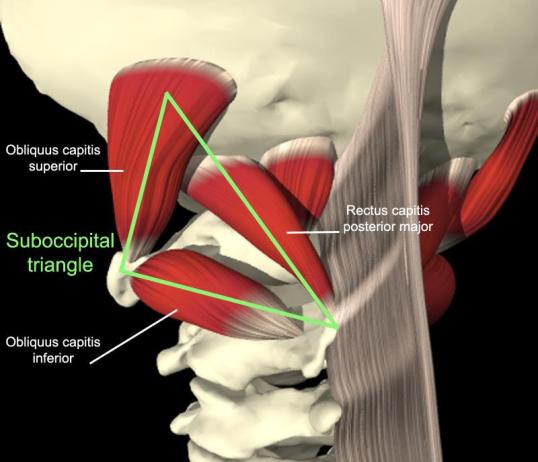When a patient complains of neck pain or headaches, I first muscle test both the cervical flexor and extension muscles and muscles which when they test bilaterally weak such as the psoas or gluteus maximus suggest a fixation of the cervical vertebrae.
I ask questions: are the muscles weak and therefore affecting the alignment, movement of the cervical vertebrae?
Are one set of muscles weak or inhibited because of compensating (facilitating) muscle.
Or is the opposite true? Is it the hypertonic or facilitated muscle the problem?
Sometimes it’s not the bigger cervical flexor/extensor muscles that are causing pain either directly or by pulling vertebrae out of alignment and putting pressure on the nerves supplying the cervical area.
Sometimes it’s the half inch to inch muscles just below the occipital (base of your skull) that attach it to either the atlas (C1) or the axis (C2) or attach atlas to axis.
These muscles are called the Rectus Capitis Posterior Major, Rectus Capitis Minor, Obliquus Capitis Superior and Obliquus Capitis Inferior.
The Rectus Capitis Posterior Major extends, laterally flexs and rotates the head. The Rectus Capitis Minor extends and laterally flexes the head. The Obliquus Capitis Superior extends and laterally rotates the head. The Obliquus Capitis Inferior rotates C1 and cranium.
Problems with these muscles can pull vertebrae out of alignment and put pressure on the cervical spinal roots and cause neck stiffness, pain and headaches. See dermatome map below for areas of innervation.
Note there is no C1 dermatome. The C1 root innervates the meninges of the posterior fossa of the skull and has no cutaneous branch; the posterior fossa also contains the meningeal branches of vagus and hypoglossal nerve. Neck stiffness may be a test of the C1 root that innervates the meninges.
For more information, please see the following blogs:
For discussion about meninges: https://drvittoriarepetto.wordpress.com/2016/05/28/why-is-my-neck-problem-causing-low-back-or-leg-pain-a-nyc-chiropractor-applied-kinesiologist-nkt-practitioner-explains-the-lovett-brother-effect-on-the-spine/
https://drvittoriarepetto.wordpress.com/2010/05/17/cranial-sacral-therapy-in-applied-kinesiology/
© 2016-Dr. Vittoria Repetto
Want more information on Dr. Vittoria Repetto and her NYC Applied Kinesiology/Chiropractic/ NKT practice at 230 W 13th St., NYC 10011; please go to www.drvittoriarepetto.com
And please check out the Patient Testimonials page on my web site.
Want to be in the know on holistic information and postings?
https://www.facebook.com/wvillagechiropracticappliedkinesiologynkt/
Or join me at Twitter: www.twitter.com/DrVRepetto

